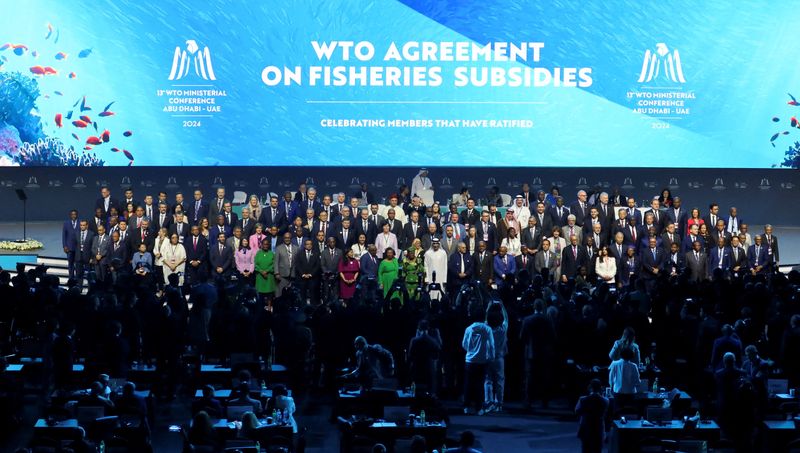By Emma Farge
ABU DHABI (Reuters) - World Trade Organization (WTO) negotiators failed to break a deadlock on major reforms in the early hours of Saturday despite talks extending deep into overtime in Abu Dhabi, in what some delegates said was a triumph of national interest over collective responsibility.
Here is a summary of what was achieved and what was not:
E-COMMERCE
- Countries agreed to extend a moratorium on placing tariffs on digital goods until the next ministerial conference in two years' time. Then the deal is set to expire at the start of that meeting, requiring more extensive negotiations.
- Several countries, including India and South Africa, were opposed to the extension of a moratorium on e-commerce backed by the vast majority of countries and seen as vital to businesses to avoid tariffs on digital goods like film downloads.
- On the plus side, a draft programme has been agreed for future work beyond Abu Dhabi.
DISPUTE SETTLEMENT
- Countries agreed to commit to continue negotiations in 2024 to try to resolve a crisis in its dispute settlement system whose top court has been hobbled for four years due to U.S. opposition.
- This means many trade disputes are unresolved since countries can appeal them into a legal void and the WTO's rules cannot be enforced.
- India's minister Piyush Goyal has said it is "sad" countries are obstructing outcomes. He did not mention Washington directly but said he had raised a lack of progress on fixing the WTO's dispute system with U.S. Trade Representative Katherine Tai in a meeting earlier this week.
- Tai has said negotiations on this issue are positive and have shown progress. However, delegates say obstacles abound and are privately sceptical of them making much further headway in a U.S. presidential election year.
- A group of countries sought to reach a friendly agreement, supported by the European Union, to refrain from appealing WTO disputes into the void but this did not win consensus among members in Abu Dhabi, trade sources said.
AGRICULTURE
- No agreement was reached in Abu Dhabi.
- India, which is facing farmer protests at home and has elections due by May, had sought a permanent solution on public stockholding (PSH) - a term that refers to state policies on food procurement aimed at ensuring food security.
- Two alternative solutions were envisaged in a draft agreement. One aimed to find a permanent solution to the issue at this meeting and the other one commits to intensify negotiations and extend to other developing countries the privileges only India currently enjoys under WTO rules.
- India rejected the second proposal, intended to appease them, in talks between a few key countries including the United States, Brazil and China, a source in the room said.
FISHERIES
- No deal was reached in Abu Dhabi.
- Countries had tried to agree to the second part of an international WTO agreement to curb government subsidies that critics say encourage industrial fishing fleets to empty the world's oceans. A first part was agreed in 2022 and will take effect if and when enough countries ratify it.

- Many participants, including USTR's Tai, saw this as the most likely topic where a deal could be reached. Environmentalists say it is vital for the world's oceans.
- The chair of the talks issued a new draft agreement on Friday morning with a few sections still in yellow, indicating areas of non-agreement including rules for phase-in periods for developing countries.